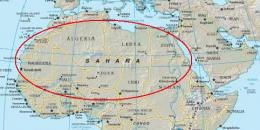 Europe has long been interested in developing alternative energy sources. And, one of the more interesting places that some Europeans are looking for solar power is the Sahara. With the vast amounts of sun beating down on the Saharan desert, it seems an ideal place for solar panels. The Desertec Industrial Initiative, a consortium of 12 companies, including Siemens and Deutsche Bank, aims to make Saharan solar power for Europe a reality. But it would not exactly be easy.
Europe has long been interested in developing alternative energy sources. And, one of the more interesting places that some Europeans are looking for solar power is the Sahara. With the vast amounts of sun beating down on the Saharan desert, it seems an ideal place for solar panels. The Desertec Industrial Initiative, a consortium of 12 companies, including Siemens and Deutsche Bank, aims to make Saharan solar power for Europe a reality. But it would not exactly be easy.
Europe has long been interested in developing alternative energy sources. And, one of the more interesting places that some Europeans are looking for solar power is the Sahara. With the vast amounts of sun beating down on the Saharan desert, it seems an ideal place for solar panels. The Desertec Industrial Initiative, a consortium of 12 companies, including Siemens and Deutsche Bank, aims to make Saharan solar power for Europe a reality. But it would not exactly be easy.
First of all, there is the fact that Africa is not exactly connected by land to Europe. The Initiative has a plan for that, though. The Guardian reports that power lines will stretch across the Mediterranean to provide as much as 15% of Europe' + char(39)+ N's electric power by 2050. Another issue is the fact that there are some, er, less than stable countries involved.
Just as energy from oil can be disrupted by conflict and political turmoil in African nations, solar energy in the Sahara could be impacted by problems in the region. And, of course, if Saharan countries agree to allow such farms on their land, it is likely that some of the power will have to go to African cities, and that there will be leases to pay and perhaps royalties. It is likely that some sort of financial arrangement will have to be made, and could affect the project' + char(39)+ N's profitability.
The technology to be used for the solar farms is described by The Guardian:
The solar technology involved is known as concentrated solar power (CSP) which uses mirrors to concentrate the sun' + char(39)+ N's rays on a fluid container. The super-heated liquid then drives turbines to generate electricity. The advantage over solar photovoltaic panels, which convert sunlight directly to electricity, is that if sufficient hot fluid is stored in containers, the generators can run all night.
The technology has been around for years, but never used on this scale. There are hopes that, if everything goes well, the first power station of the project could be build by 2015.

 Previous page
Previous page Back to top
Back to top







